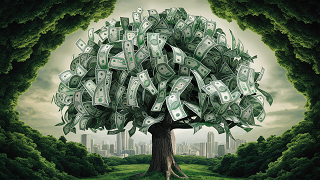
Business Growth and Sustainability
In the 21st century, consumers and businesses alike are increasingly Prioritizing Sustainability. From ethical sourcing to eco-friendly packaging, the green wave is crashing upon the shores of American commerce, reshaping industries and influencing consumer choices.
But can endorsing sustainability truly be a catalyst for business growth? The answer is a resounding yes and the evidence is sprouting across the fertile panorama of the US economy.

The Green Imperative: Aligning Values with Bottom Lines
Gone are the days when sustainability was solely a niche concern for tree-hugging hippies. Today, it’s a strategic imperative driven by several factors.
Consumer demand: A 2019 Nielsen study revealed that 66% of global consumers are willing to pay more for sustainable products. In the US, millennials, a generation with significant purchasing power, are particularly environmentally conscious.
Regulatory outlook: Governments worldwide are tightening environmental regulations, pushing businesses to adopt sustainable practices to avoid penalties and fines.
Resource scarcity: Climate change and depletion of natural resources are forcing businesses to rethink their dependence on unsustainable practices.
Investor interest: Socially responsible investing (SRI) is on the rise, with investors increasingly allocating funds to companies with strong sustainability records.
These converging forces create a compelling proposition for American businesses: sustainability isn’t just good for the planet, it’s good for business.

Blooming Benefits: The Tangible Rewards of Going Green
Adopting sustainable practices can yield a bouquet of benefits for businesses.
Cost reduction: Resource efficiency measures like energy-saving upgrades and water conservation can significantly decrease operational costs.
Innovation and differentiation: Sustainable practices often necessitate innovation, leading to the development of new products, services and business models that give companies a competitive edge.
Enhanced brand image: Consumers are increasingly drawn to brands with strong sustainability commitments, boosting brand reputation and loyalty.
Attracting and retaining talent: Top talent seeks employers who align with their values. A commitment to sustainability can attract and retain skilled employees.
Improved risk management: Sustainable practices can mitigate environmental risks, reducing potential liabilities and ensuring long-term stability.

Case Studies in Green Success: American Businesses Blooming with Sustainability
The power of sustainability isn’t just theoretical. Here are a few inspiring examples of American businesses flourishing thanks to their green initiatives.
Patagonia: This outdoor apparel giant is famous for its commitment to environmental activism and product durability. Patagonia repairs, recycles and sells used gear, extending the life cycle of its products and reducing waste.
Interface: This carpet manufacturer transitioned from a polluting industry leader to a sustainability champion. Interface now uses recycled materials and closed-loop manufacturing processes, significantly reducing its environmental footprint.
Seventh Generation: This cleaning products company prioritizes natural ingredients and sustainable packaging. Seventh Generation’s commitment to transparency and environmental responsibility has powered its growth and garnered loyal customers.
These are just a few examples, but they showcase the diverse ways American businesses are reaping the rewards of sustainability.
From outdoor giants to cleaning companies, the green revolution is blooming across industries, proving that environmental consciousness and economic success can go hand-in-hand.

Cultivating a Sustainable Future: Practical Tips for Every Business
The journey towards sustainability is a continuous one, but any business can take steps to cultivate a greener future. Here are some practical tips.
Conduct an environmental audit: Assess your current operations and identify areas for improvement.
Set measurable goals: Define specific sustainability goals and track your progress towards achieving them.
Engage your employees: Foster a culture of sustainability within your company by educating and empowering employees to get involved.
Partner with stakeholders: Collaborate with suppliers, customers and NGOs to amplify your sustainability efforts.
Communicate your commitments: Be transparent about your sustainability initiatives and share your progress with stakeholders.

In Conclusion: Seeding the Future of American Business
Sustainability is not just a fad; it’s the fertile ground where the future of American business will flourish. By adopting green practices, companies can cultivate not only environmental benefits but also economic advantages.
From cost reduction and innovation to brand loyalty and talent attraction, the rewards of sustainability are ripe for the picking. So, take the first step today, nurture your commitment to the green revolution and watch your business blossom in the sunshine of a sustainable future.
Let’s move beyond short-term gains and plant the seeds of a brighter future for our business, community and our planet.















Thanks for sharing. I read many of your blog posts, cool, your blog is very good.